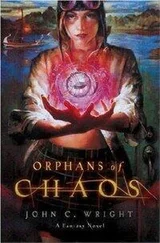"We use them, you know, semaphore. Or listen to jingles. Or for light. Or as sails for boats. No one mind, as long as ads get shown."
"But you do not use them to search out useful products and services?"
"No one sells to Afloats. Almost no one. No one, we'd be dead. Almost no one, almost dead. Look it." And he pointed above the central barge.
Phaethon was still not accustomed to how bad his eyesight was. There was no amplification when he squinted. He saw a swarm of darting and hovering specks, glittering gold, like bees, above and around the pavilions and tents rising above the barge. But he could not resolve them into clear images. "I cannot make out what is out there."
Oshenkyo was seated on the wide, low limb of a gold-extraction bush, cupping his hands over his ears, then covering, listening to the changes in sound. He spoke absently: "Vulpine First Ironjoy on yonder barge runs a thought-shop. We get work, sometime. Can get buffers and tangle lines to reach deviants and dark markets through the Big Mind." By which he meant the mentality.
Phaethon was intrigued. Work? The boycott of the Hortators evidently had enough holes and gaps to enable these people to live.
Then Phaethon smiled sadly at his own thought. "These people" ... ? Did he still think of himself as somehow apart from the other exiles?
Phaethon said: "No, I can see the barge. But what are those miniature flying instruments swarming around the area here?"
"Constables. Tinee-tiny. About so big." Oshenkyo held up his thumb.
"So many?"
"Zillions. They watch us all time. Good thing, too. Otherwise, we club each other right quick dead."
"Indeed? Are we all so violent, then?"
Oshenkyo shrugged a broad, one-shoulder shrug. "All us crazy, filthy people. Got nothing to lose."
"Why are there such a number of police?"
Oshenkyo squinted at him. "We still got rights. No thieving, no killing, no broke words."
"What about lying?"
Oshenkyo stared out at the bay, sniffed, gave another one-shouldered shrug. "Fib till your tongue falls out. No one here to buy a thought-read machine. We not like other folk: we don't know what goes on inside other people head. Just like long-ago days, eh? But swaps, bargains, work, all that: very sacred. You give word, can't take back. You got?"
Evidently contract laws were still enforced. "I got."
But Phaethon realized that it would be a dangerous system, since the Oecumene law, with no emotion and no favoritism, would enforce any bargain struck, no matter how foolish, no matter how risky. Had he had access to Sophotech foresight and advice, the risks would have been small. He didn't. Had he been raised in a society where suspicion and care were normal, he could have been in the habit of mistrusting his fellowmen, and of striking careful bargains. He wasn't.
Oshenkyo squinted up at him. "All be clear as clear once you sign our Pact. You join up, be one of us, eh? Otherwise, not so great live here. Nowhere else to go but sea."
This did nothing to calm Phaethon's qualms. But he smiled in joy and relief. If he had qualms, that meant he had plans, he had a goal. He was young and in good health, and he had a supply of nanomaterial which could be adapted to medical geriatrics. He might live long enough to outlive the Hortators' term of exile; the political circumstance of the Oecumene might change. Who could tell?
"... Or maybe the horse could learn how to sing." Phaethon murmured.
"Eh? What's that?"
"Sorry. I was ruminating over my hopes for the future."
"Hope? You said 'horse.' "
"There is a story about a man condemned by a tyrant, who pleads for one more year of life, telling the tyrant that, if the sentence is suspended for a year, he will teach the tyrant's prize stallion to sing hymns. The tyrant agrees. The other prisoners are amused to see this one prisoner, every day, patiently caroling in the stables. When the other prisoners mocked his folly, the man replied that a great deal could happen in a year. The tyrant could die; the horse could die. And, who knows? The horse could learn to sing."
"Stupid story."
"I always used to think so, too. Now, though, I'm not sure. Are false hopes better than none at all? Perhaps they are." Phaethon's eyes were fixed on a point beyond the horizon.
"No, is stupid because would not take so long to download info and singing routines into horse, if brain-fittings are standard. A year? Would only take five minute."
"This is a very old story, from the days before horses were extinct."
Now Oshenkyo squinted in surprise. "Funny, I thought horses were make-up, you know, genetified, by Red Manor Queens."
"Make-up? You mean invented?"
"Make-up! Like dragons and gryphons and elephants."
"Modern elephants are a genetic reconstruction of a real species."
Oshenkyo snorted. "With flappy-arms on their noses? You think such creature as that evolve by itself? Nar. No how. Red Manor folk make up for sure. Just their kind of stupid thing. Ah, wait!" Now Oshenkyo jumped to his feet and waved his arm high. "Lookit there! Welcome menus! You get meet Iron-joy. He tell you what's what. You listen him, he get you fine-dandy job assignments, maybe you eat, maybe you sleep in-of-doors, out of rain. Nice-good, eh? Lick up nice chum to him, now, and smile pretty!"
"I shall endeavor to be on my best behavior," Phaethon said in a voice of heavy irony.
A party of three figures was picking its way up the slope of the cliff to the spot where Phaethon stood with Oshenkyo. All three wore blue-green housecoats of antique design, with flared shoulders and long skirts, and many pockets to hold a dozen house instruments. The one in the middle (perhaps the leader) had a design of gold attention-thread running through the chest pockets. Their faces were shadowed by wide flat straw hats whose brims hung over their shoulders. The color elements in the housecoats were not correctly attuned; all three figures were surrounded by a web of green-blue rainbows, shifting glints and shadows, and it made them look as if they were walking underwater.
The lead figure seemed to be a base humaniform until he was within ten feet of Phaethon. The color play of his malfunctioning coat had hidden his true silhouette. As the stranger approached, Phaethon saw he had a second pair of arms and hands springing from his doubled shoulders. Beneath the shadow of his hat, his face was an immobile mask of bony cartilage, with three or four pairs of eyes and secondary eyes, microwave horns, infrared sockets, electrodetection cells, and ELF antennae. The face lacked a nose; the mouth was an in-sectoid clamp.
Phaethon's gaze swung left and right. The other two wore standard faces, male and half-male, with teeth made of glittering diamond. The male had a beard woven with many-colored sensation strands. The half-male had similar strands dangling from her hair. The two wore black metallic cusps covering their eyes, perhaps a crude type of sense-filter and interfacer, controlled by blinks and eye motions. The man was sucking on a colored strand drooping from his moustache.
The quadruple-armed leader stepped forward and looked Phaethon's gold-and-black armor up and down. Phaethon returned the inspection.
Phaethon recognized the fellow's body design from the late Fifth Era, when the mass-minds, losing money and prestige, had attempted to cut costs on space services by having specialized serf-bodies replace expensive EVA machinery. The serf-creatures were immensely strong, having been used as longshoremen and hullsmiths, and could perceive many frequencies of radiation at once. Their space suits or second skins could be made much more cheaply than the elaborate space armor needed by a human-shaped man. Serfs required very little food and water; their bodies could recycle much of their own waste materials.
Читать дальше











